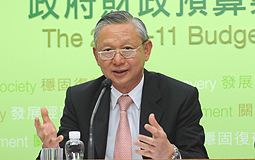 |
Drug fight: Secretary for Security Ambrose Lee briefs the media on the Government's measures against youth drug abuse. |

|
More youngsters are using drugs and at an earlier age, a Narcotics Division survey has found.
The study, conducted during the 2008-09 school year, collected questionnaires from 158,000 students, covering all post-secondary institutions and 100 primary and secondary schools, or 20% of the total student population.
It found 4.3% of secondary school students had abused drugs, up one percentage point on four years ago. Among secondary students aged 12 or below, 4.6% said they had abused drugs, far higher than the 2.4% figure seen four years ago.
Rising trend
The study showed a rising trend in the number of young people who abused psychotropic substances. Among the primary school students who said they had abused drugs, 37.5% used cough medicine and 30.7% used inhalants.
Nearly half of the secondary school students who claimed to have abused drugs used ketamine (49.4%), followed by cannabis (35.6%).
The survey also affirmed the hidden nature of youth drug abuse. About 36.2% of secondary students who claimed to have abused drugs indicated they took them at friends' homes, or in their own homes (25%), while another 25% abused drugs in entertainment venues.
Government efforts
Chief Executive Donald Tsang said the survey results show the Government's determination and strategy to fight drug problems is necessary.
"While the problem is seen to be more serious, the degree of Hong Kong's youth drug abuse problem has not reached a totally unbridled stage as witnessed in some Western countries. The Financial Secretary has proposed a $3 billion capital injection into the Beat Drugs Fund and the setting aside of $52 million in additional funding in the new financial year to expedite and strengthen anti-drug work."
Urging the community to help the Government foster a drug-free environment for youngsters, Mr Tsang said the administration will continue to address the issue through community mobilisation and support, drug testing, treatment and law enforcement.
Noting the school drug-testing scheme in Tai Po is running smoothly with no confirmed positive cases found so far, he said the trial is effective in encouraging more students to seek counselling services and assistance, allowing early intervention by social workers and other professionals. The Government will assess the scheme and decide on whether to expand it.
Action plan
Speaking at a press conference this afternoon, Secretary for Security Ambrose Lee said the Government attaches great importance to youth drug abuse and is committed to tackling the issue.
"In the Budget announced yesterday, the Financial Secretary proposed a $3 billion capital injection into the Beat Drugs Fund. Should the Legislative Council approve the proposal, the new capital injection would substantially increase the capital base of the [fund] to $3.35 billion. This will enable the fund to generate an enhanced level of income and more resources to sponsor anti-drug programmes organised by various quarters of the community," he said.
"In addition, the Financial Secretary has already set aside $52 million additional funding for bureaux and departments to expedite and strengthen anti-drug work along the directions promulgated by the Chief Executive."
Measures to be launched include:
* opening four new Counselling Centres for Psychotropic Substance Abusers;
* strengthening the manpower of District Youth Outreaching Social Work teams;
* enhancing the Police School Liaison Scheme;
* increasing the number of Police dogs and Police posts;
* stepping up anti-drug publicity;
* promoting community mobilisation programmes; and,
* increasing the capacity of youth drug treatment and rehabilitation centres subvented by the Department of Health.
Enforcement work
Mr Lee said law-enforcement agencies will also step up their anti-drug operations. They will relentlessly curb the supply of illicit drugs in Hong Kong and work with their counterparts on the Mainland as well as overseas to stop the flow of illicit drugs into Hong Kong.
"The Police will strengthen the collection of intelligence on drug trafficking and drug taking, and enhance the Police School Liaison Scheme. The Customs & Excise Department will enhance drug detection at boundary control points to combat cross-boundary drug trafficking.
"For greater deterrence, law enforcement agencies will work closely with the Department of Justice in seeking the courts to pass heavier sentences."
When asked whether the Government will adopt mandatory drug testing, Mr Lee said it is a controversial subject involving technical, legislative and human rights issues. The Government will research on this option and launch a public consultation on it this year.
Go To Top
|



